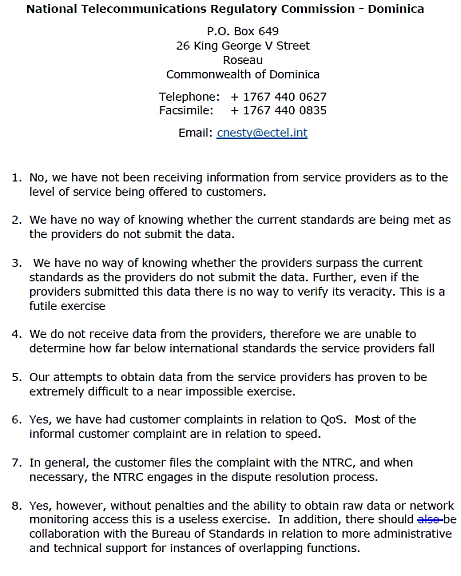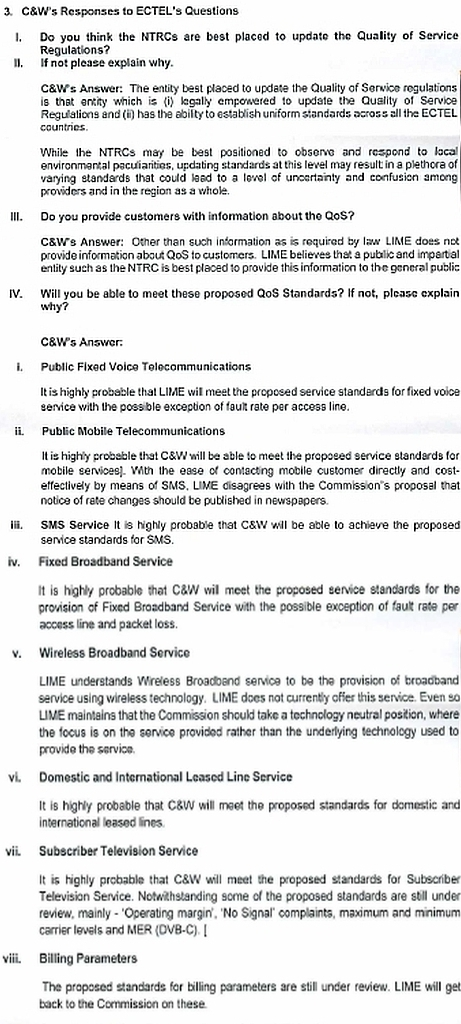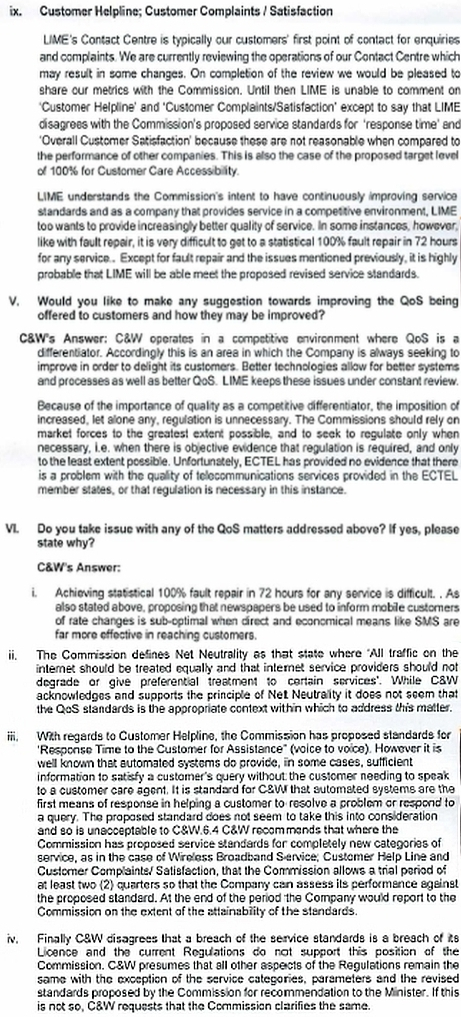The ECTEL experience of quality of service regulation
25.08.2020Introduction
The Eastern Caribbean Telecommunications Authority (ECTEL) develops model laws and regulations for five countries: Dominica, Grenada, Saint Christopher and Nevis, Saint Lucia, and Saint Vincent and the Grenadines. The models are transposed into national acts and regulations according to national priorities.
ECTEL consulted on its draft quality of service regulations, first in 2005 and then in 2006, before adopting them in 2007. Four of the ECTEL countries then transposed the regulations into their national frameworks: Dominica in 2008, Grenada in 2009, Saint Christopher and Nevis in 2008, and Saint Lucia in 2007. ECTEL proposed revisions to the regulations in 2015, and asked the regulators and service providers in the member states for their opinions (ECTEL 2015a).
The first document, reproduced below, shows the replies from the regulator in Dominica to questions about experience of the regulations; the regulator in Grenada replied in similar terms. The regulator in Saint Vincent and the Grenadines (which has not transposed the current quality of service regulations into its national framework) also replied, but only to comment on the proposed parameters and targets.
The second document, partially reproduced here, show the replies from Cable and Wireless (also called “Lime” then and “Flow” now) in Dominica to questions about the proposed parameters and targets, which were more demanding than those in the current regulations; Cable and Wireless in Saint Lucia replied in almost identical terms. Digicel did not reply.
Conclusion
In summary:
- The regulators had not been receiving reported measurements and were not enforcing compliance. There were penalties on conviction for non-compliance in the relevant acts, such as a fine of about USD 1 850 or imprisonment for six months for providing no, false, or misleading information; however, the regulators did not appear to be exercising these.
- At least one service provider was capable of meeting the proposed standards, so presumably it had already been meeting the existing standards though it had not been reporting the measurements. Its suggestion that ECTEL had not provided evidence of the need for quality of service regulation appears to be correct; its suggestion that a breach of the standards was not a breach of its licence is difficult to judge, as the licence does not appear to be publicly available.
Since then ECTEL has proposed further revisions, asked the regulators in the member states for their opinions and submitted the model regulations to the ministers in the member states for enactment (ECTEL 2016).
The experience of the regulator in Dominica of the current quality of service regulation

Source: ECTEL 2015b
The view of a service provider in Dominica of the proposed quality of service regulations


Source: ECTEL 2015c .
References
ECTEL. 2015a. Terms of Reference on Quality of Service Regulations. https://www.ectel.int/wp-content/uploads/2016/12/TOR-QoS-public-consultation.pdf.
ECTEL. 2015b. Response to ECTEL Consultation on Terms of Reference on Quality of Service Regulations: National Telecommunications Regulatory Commission – Dominica. https://www.ectel.int/wp-content/uploads/2015/06/NTRC-DCA-response-QoS.pdf.
ECTEL. 2015c. LIME’s Response to The Limited Consultation Document titled “Recommendation of the Easter Caribbean Telecommunications Authority (ECTEL) to the National Telecommunications Regulatory Commissions to consult on Terms of Reference on the Quality of Service Regulations.” https://www.ectel.int/wp-content/uploads/2015/06/LIME-SLU-response-QoS.pdf.
ECTEL. 2016. Electronic Communications (Quality of Service) Regulations. https://www.ectel.int/wp-content/uploads/2015/06/QoS-regs.pdf.
Last updated on: 19.01.2022